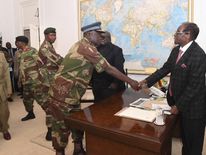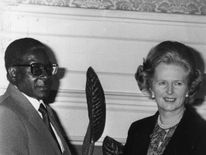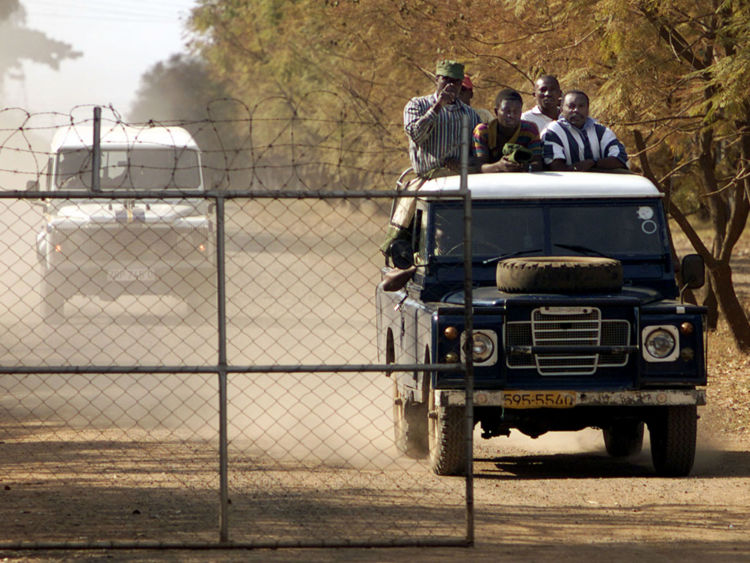Source: Assassination attempts, power grabs and tyranny – Robert Mugabe’s rule in Zimbabwe
Robert Mugabe was the first prime minister and, later, first president of an independent Zimbabwe, formerly Rhodesia.
A qualified teacher and able negotiator, he was regarded on his assumption of power as the one man capable of healing the wounds left by years of civil war.
But his brutal suppression of a revolt by the Ndebele people of the south provided an early taste of the methods that would make Zimbabwe a byword for political repression and economic mismanagement.
:: Robert Mugabe resigns as President of Zimbabwe
At 93, Mr Mugabe was the oldest serving head of state and one of Africa’s longest leaders.
In 1996 – four years after his first wife Sally died, aged 59 – Mr Mugabe married his former secretary, Grace Marufu, 40 years his junior, in a tribal ceremony.
Mr Mugabe started his political career fighting against the white minority government of Ian Smith.
He was detained for 10 years until 1974 before leaving for Mozambique, where he helped dictate the Zimbabwe African National Union’s (ZANU) role in guerrilla warfare.
:: Zimbabwe’s next president: Who is ‘The Crocodile’?
When, in 1978, Mr Smith bowed to external pressure and agreed to representative elections, they were won by the rival UANC, the only black party to have renounced violence.
The UK and the US, however, refused to lift sanctions, and a conference of all parties was organised at Lancaster House in London.
Mr Mugabe, as leader of the ZANU, which drew support from the majority Shona people, attended the talks as effective prime minister-in-waiting.
:: What next for Zimbabwe’s crippled economy?
In the ensuing elections, in March 1980, ZANU-PF (Zimbabwe African National Union – Patriotic Front) won 57 of 80 seats in the new parliament, where a further 20 seats were reserved for the country’s white minority.
Mr Mugabe himself survived two assassination attempts during the campaign.
He became prime minister but the result also gave rise to an uneasy coalition with his Zimbabwe African People’s Union (ZAPU) rivals, representing the Ndebele.
:: Anti-Mugabe rally ‘truly spine-tingling’
In 1983, he dismissed ZAPU’s Joshua Nkomo from his cabinet, triggering an armed rebellion in Ndebele land.
This was put down with marked brutality by elements of the new Zimbabwe army, whose training had been conducted along North Korean lines.
Afterwards, in 1987, Mr Mugabe marked his assumption of unchallenged power by abolishing the office of prime minister and declaring himself executive president.
He was subsequently re-elected in 1990, 1996 and 2002, in elections where fairness was increasingly called into question.
:: How Zimbabwe has collapsed under Robert Mugabe
Mr Mugabe styles himself as the “Grand Old Man” of African politics, with defenders saying his government achieved notable improvements in both health and education for the black majority.
But he is reviled in the West as an authoritarian who mishandled the economy and resorted to violence to maintain power.
The country’s economy collapsed under his rule, and massive imports of foreign aid were needed simply to feed the people as hyperinflation hit from the late 1990s.
By 2009, Zimbabwe stopped printing its currency and in 2015 it announced plans to completely switch to using the US dollar.
Military intervention in the civil war in the neighbouring Democratic Republic of Congo proved a heavy financial burden.
But it was the forced distribution of land that proved decisive, turning what had been an exporter of food into a country with five million people dependent on food aid.
When Mr Mugabe became prime minister, some 70% of arable land was owned by about 4,000 descendants of white settlers.
Favouring a “willing buyer, willing seller” plan for the gradual redistribution of land, little was achieved until Mr Mugabe began using force in 1999 and 2000.
Self-styled “war veterans” invaded white-owned farms, and the British public quickly became familiar with stories of beatings, rape and killings.
The farm invasions severely affected agricultural production, leaving much of the country’s population lacking enough food to meet basic needs.
:: ‘Gucci Grace’ Mugabe: Who is Zimbabwe’s first lady?
In 2002, the Commonwealth suspended Zimbabwe’s membership. When this was extended 18 months later, Mr Mugabe pulled his country out.
The US, meanwhile, had imposed sanctions of its own, saying the situation in Zimbabwe endangered the entire southern African region.
In 2004, the African Union openly criticised Zimbabwe’s open violation of human rights, citing the arrest and torture of lawyers, journalists and MPs.
:: Sky Views: My Zimbabwe trip turned to torture
Mr Mugabe has also been accused of using starvation as a conscious political weapon, by denying food aid to those areas supporting the opposition.
He was initially defeated in the presidential vote in 2008, with Morgan Tsvangirai winning by 47.9% to 43.2%.
But ahead of a run-off between the two as neither had secured 50% of the vote, a violent campaign against supporters of Mr Tsvangirai saw scores killed and thousands displaced.
Mr Tsvangirai pulled out of the run-off, and Mr Mugabe was re-inaugurated despite strong international condemnation of the election.
Mr Mugabe won another presidential election in 2013, but the ballots were widely not considered free or fair, with claims of vote rigging and fears over violence.
Zimbabwe, which has an unemployment rate of more than 90%, is due to hold elections next year, for which Mr Mugabe had pledged to stand for office in again.

























COMMENTS
Robert
Robert!
Robert!! are you there?
Where the hell has he gone?
………….